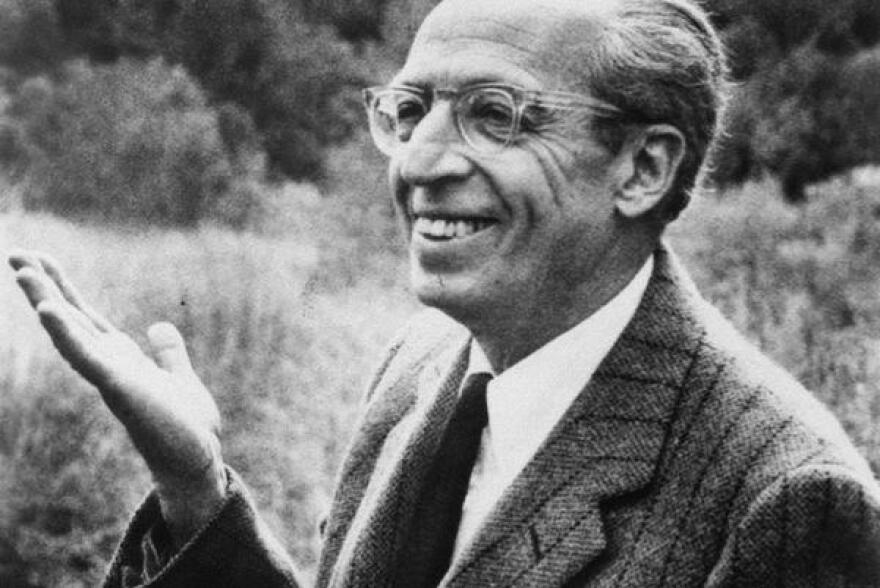As June is LGBT-Pride Month, we here at WXXI 91.5 Classical Radio have been reflecting on how many LGBT (Lesbian, Gay, Bisexual, Transgender) artists have rocked the classical music scene throughout the ages. From composers, to performers, to conductors, so many LGBT people (Here’s a short list: Benjamin Britten, Samuel Barber, Ethyl Smyth, Arnold Schoenberg) have shaped and innovated classical music for the better. Let’s press pause for a second to celebrate classical composers and artists that have and continue to blaze a trail for acceptance not only for their sexuality, but for the integrity of their art and the progress of classical music as a whole.
As early as 1670, Julie d’Aubigny, mostly known as La Maupin, made her living as both opera singer and skilled swordswoman. La Maupin was a tour de force, take-no-prisoners artist and a resident singer at the
Paris Opera and the Opéra du Quai au Foin in Brussels. She was known for dressing in exclusively men’s clothing, but never hid the fact that she was a woman. La Maupin did a few things that were deemed more than…. Questionable… by even today’s standards. Not only did she elope with her fencing instructor and perform daring fencing shows, but she actually impersonated a postulate in a convent to be with her female lover. But the story doesn’t stop there: she even went so far as to steal the body of a dead nun to put in her lover’s bed and then set the room on fire to make an escape. Naturally, she was sentenced to death by fire for kidnapping, body snatching, arson, and failing to appear before the tribunal… but she wasn’t charged as a woman. Because she wore men’s clothing, she was charged as a man! She was then personally pardoned by the king of France, who she thanked by breaking the law of no public dueling by publically dueling and defeating three men in Paris over her kissing a woman in public. Despite her raucous behavior, La Maupin was always noted for her impeccable artistry, beautiful contralto voice, acting abilities, and androgynous appearance. As the saying goes: well-behaved women rarely make history. French author Théophile Gautier wrote a story about La Maupin titled Mademoiselle de Maupin, mixing fact with fiction and telling the stories of Julie d’Aubigny’s incredible life.
Jumping to a beloved American composer of the 20th century, Aaron Copland lived in a time when sexual orientation homosexuality was starting to lose its taboo-ness. Known for classics such as Appalachian Spring, Rodeo, and Billy the Kid, Copland is an undeniable representative of the classic American sound and patriotism. Although very quiet about his personal life, Copland openly travelled with his life partners.

He was known to have had many relationships with men, including composer John Brodbin Kennedy, photographer Victor Kraft, and pianist Paul Moor. As Copland went on stealing the hearts of Americans with his music, the Cold War raged on and tensions with Communist powers filled the American people with fear. Copland was investigated by the FBI during the Red Scare in the 1950s. He and 150 other American artists were thought to be colluding with the USSR, which caused total chaos and panic in the American people. Due to the bad press and rumors of treason, Copland had his piece, A Lincoln Portrait, excluded from the inaugural concert for President Eisenhower. Despite the accusations, many members of the arts community rushed to his aid, protesting his blacklisting, and holding up his distinctly American style of composition as the posterchild for patriotism. The investigations ended in 1975, and Copland continued to flourish as both a composer and conductor until his death in 1990 at the ripe age of 90.
Even today, artists and composers continue to make history, break down walls, kick butt, and take names. David Diamond, a Rochester Native, attended the Cleveland Institute of Music and returned to his home

town at the Eastman School of Music (Rochester Pride!). The recipient of three Guggenheim Fellowships, The National Medal of the Arts, and a Fulbright professorship, Diamond certainly kept himself busy. He even wrote the opening themes for CBS Network’s shows “Hear it Now” (Radio) and “See it Now” (Television)! One of the most respected composers of his era, Diamond has been openly and proudly homosexual well before it became widely acceptable, and never hid his truth both in his personal life and his compositions. Diamond Art and music critic from the San Francisco Chronicle, Alfred Frankenstein, sums Diamond’s music up best by saying: "The outstanding qualities of [his] works seem to be [their] fine, granitic seriousness, [their] significant compression of a large idea into a small space, and [their] spare, telling use of a large orchestra.” Diamond died in Rochester at the age of 89 in 2005.
These artists and so many others have been a crucial part of classical music’s rich history. Without their contributions, classical music would not be the vibrant, diverse field that we so dearly love today, and we continue to fly the rainbow flag this June in honor of all their creativity, musical spark, and artistic contributions.

